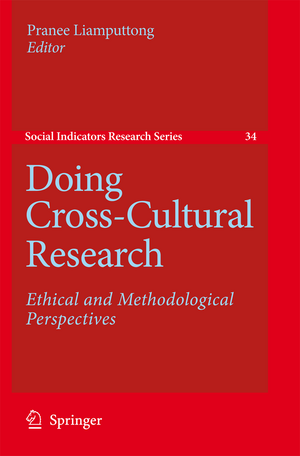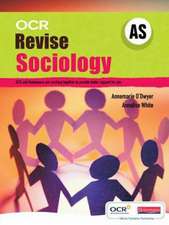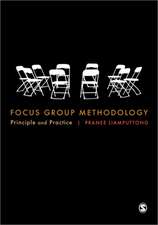Doing Cross-Cultural Research: Ethical and Methodological Perspectives: Social Indicators Research Series, cartea 34
Editat de Pranee Liamputtongen Limba Engleză Hardback – 12 aug 2008
| Toate formatele și edițiile | Preț | Express |
|---|---|---|
| Paperback (1) | 1219.01 lei 6-8 săpt. | |
| SPRINGER NETHERLANDS – 17 noi 2010 | 1219.01 lei 6-8 săpt. | |
| Hardback (1) | 1225.16 lei 6-8 săpt. | |
| SPRINGER NETHERLANDS – 12 aug 2008 | 1225.16 lei 6-8 săpt. |
Din seria Social Indicators Research Series
- 15%
 Preț: 601.13 lei
Preț: 601.13 lei - 5%
 Preț: 861.64 lei
Preț: 861.64 lei - 18%
 Preț: 945.47 lei
Preț: 945.47 lei - 15%
 Preț: 644.30 lei
Preț: 644.30 lei - 18%
 Preț: 959.50 lei
Preț: 959.50 lei - 15%
 Preț: 645.60 lei
Preț: 645.60 lei - 18%
 Preț: 1234.94 lei
Preț: 1234.94 lei - 15%
 Preț: 640.06 lei
Preț: 640.06 lei - 15%
 Preț: 635.47 lei
Preț: 635.47 lei - 5%
 Preț: 1105.21 lei
Preț: 1105.21 lei - 15%
 Preț: 646.11 lei
Preț: 646.11 lei - 18%
 Preț: 1233.06 lei
Preț: 1233.06 lei - 18%
 Preț: 953.03 lei
Preț: 953.03 lei - 5%
 Preț: 1101.37 lei
Preț: 1101.37 lei - 15%
 Preț: 644.82 lei
Preț: 644.82 lei - 18%
 Preț: 948.92 lei
Preț: 948.92 lei - 15%
 Preț: 642.51 lei
Preț: 642.51 lei - 18%
 Preț: 954.45 lei
Preț: 954.45 lei - 18%
 Preț: 1235.76 lei
Preț: 1235.76 lei -
 Preț: 407.56 lei
Preț: 407.56 lei - 15%
 Preț: 642.83 lei
Preț: 642.83 lei - 18%
 Preț: 955.70 lei
Preț: 955.70 lei - 15%
 Preț: 644.49 lei
Preț: 644.49 lei - 18%
 Preț: 952.89 lei
Preț: 952.89 lei - 15%
 Preț: 648.89 lei
Preț: 648.89 lei - 15%
 Preț: 645.47 lei
Preț: 645.47 lei - 18%
 Preț: 1224.54 lei
Preț: 1224.54 lei
Preț: 1225.16 lei
Preț vechi: 1494.10 lei
-18% Nou
Puncte Express: 1838
Preț estimativ în valută:
234.46€ • 254.59$ • 196.95£
234.46€ • 254.59$ • 196.95£
Carte tipărită la comandă
Livrare economică 22 aprilie-06 mai
Preluare comenzi: 021 569.72.76
Specificații
ISBN-13: 9781402085666
ISBN-10: 1402085664
Pagini: 342
Ilustrații: XXXI, 310 p.
Greutate: 0.66 kg
Ediția:2008
Editura: SPRINGER NETHERLANDS
Colecția Springer
Seria Social Indicators Research Series
Locul publicării:Dordrecht, Netherlands
ISBN-10: 1402085664
Pagini: 342
Ilustrații: XXXI, 310 p.
Greutate: 0.66 kg
Ediția:2008
Editura: SPRINGER NETHERLANDS
Colecția Springer
Seria Social Indicators Research Series
Locul publicării:Dordrecht, Netherlands
Public țintă
ResearchCuprins
and Conceptual Framework.- Doing Research in a Cross-Cultural Context: Methodological and Ethical Challenges.- Language and Communication in Cross-Cultural Qualitative Research.- The Researcher as Insider Versus the Researcher as Outsider: Enhancing Rigour Through Language and Cultural Sensitivity.- Respecting Culture: Research with Rural Aboriginal Community.- Kaupapa Mäori Research, Supervision and Uncertainty: “What’s a Päkehä Fella to Do?”.- Ethical and Methodological Perspectives.- Researching Anger in Indigenous Men in Prison: A Perspective from Non-Indigenous Researchers.- Researching Refugees: Methodological and Ethical Considerations.- The Ethics and Politics of Researching HIV/AIDS Within the School Context in South Africa.- Exploring Ethical Issues When Using Visual Tools in Educational Research.- Methodological Considerations.- Decolonised Methodologies in Cross-Cultural Research.- “Living on the Ground”: Research Which Sustains Living Culture.- Researching with Aboriginal Men: A Desert Experience.- Creating Collaborative Visions with Aboriginal Women: A Photovoice Project.- Participatory Photography in Cross-Cultural Research: A Case Study of Investigating Farmer Groups in Rural Mozambique.- On the Use of Focus Groups in Cross-Cultural Research.- Let’s Tell You a Story: Use of Vignettes in Focus Group Discussions on HIV/AIDS Among Migrant and Mobile Men in Goa, India.- Face-to-Face versus Online Focus Groups in Two Different Countries: Do Qualitative Data Collection Strategies Work the Same Way in Different Cultural Contexts?.- Refining the Occupation of Research Across Cultures.
Recenzii
From the reviews:
“Useful for researchers who (plan to) conduct their studies among and with indigenous populations, minority and ethnic communities. … serve as a valuable starting point for researchers pondering on the meaning and practical implications of informed consent in their research area. … Overall, this compilation provides ample food for thought and concrete examples of interesting research projects for researchers who want to be reflexive on methodological, ethical and conceptual aspects of cross-cultural research and who want to be inspired to develop innovative research approaches.” (Trudie Gerrits, Medische Antropologie, Vol. 22 (1), 2010)
“Useful for researchers who (plan to) conduct their studies among and with indigenous populations, minority and ethnic communities. … serve as a valuable starting point for researchers pondering on the meaning and practical implications of informed consent in their research area. … Overall, this compilation provides ample food for thought and concrete examples of interesting research projects for researchers who want to be reflexive on methodological, ethical and conceptual aspects of cross-cultural research and who want to be inspired to develop innovative research approaches.” (Trudie Gerrits, Medische Antropologie, Vol. 22 (1), 2010)
Notă biografică
Pranee Liamputtong is Personal Chair in Public Health at the School of Public Health, La Trobe University, Melbourne, Australia. Pranee has previously taught in the School of Sociology and Anthropology and worked as a public health research fellow at the Centre for the Study of Mothers' and Children's Health, La Trobe University. She has her particular interests on issues related to cultural and social influences on childbearing, childrearing and women's reproductive and sexual health. She has published several books and a large number of papers in these areas.
Her three books on these issues have been used widely in health area: My 40 days: A cross-cultural resource book for health care professionals in birthing services (The Vietnamese Antenatal/Postnatal Support Project, 1993); Asian mothers, Australian birth (editor, Ausmed Publications, 1994); Maternity and reproductive health in Asian societies (editors, with Lenore Manderson, Harwood Academic Press, 1996).
Her more recent books include: Asian mothers, Western birth (new edition of Asian mothers, Australian birth, Ausmed Publications, 1999); Living in a new country: Understanding migrants' heaslth (editor, Ausmed Publications, 1999); Among women and reprodcution (Bergin & Garvey, 2000); and Coming of age in South and Southeast Asia: Youth, courtship and sexuality (editors, with Lenore Manderson, Curzon Press and Nordic Institute of Asian Studies (NIAS), 2002). Her most recent book in the health area is: Health, social change and communities (editors, with Heather Gardner, Oxford University Press, 2003). She has also recently completed a book on Thai women and Motherhood (to be published by Lexington Books); Becoming a Mother: A Cross-Cultural Perspective and Childbearing and Infant Care: A Cross-Cultural Perspective (both to be published byy Nova Science Publishers, New York). She is now working on Community, Health and Population (with Sansnee Jirojwong, to be published by Oxford University Press, Melbourne).
Her research method book is titled Qualitatitve research methods: A health focus (with Douglas Ezzy, Oxford University Press, 1999, reprinted in 2000, 2001, 2002, 2003, 2004); and the second edition of this book is titled Qualitative Research Methods (2005, reprinted 2005, 2006 twice). Pranee's new book is on the use of the Internet in qualitative research: Health Research in Cyberspace: Methodological, Practical and Personal Issues of Researching Online (Nova Sciences Publishers, New York, 2006). Her most recent book is titled Researching Vulnerable People: A Guide to Sensitive Research Methods (Sage, London, in press). She is now preparing a book on Knowing Differently: An Introductiono to Experiential and Arts-Based Research Methods, to be published by Noval Science Publishers, New York.
Her three books on these issues have been used widely in health area: My 40 days: A cross-cultural resource book for health care professionals in birthing services (The Vietnamese Antenatal/Postnatal Support Project, 1993); Asian mothers, Australian birth (editor, Ausmed Publications, 1994); Maternity and reproductive health in Asian societies (editors, with Lenore Manderson, Harwood Academic Press, 1996).
Her more recent books include: Asian mothers, Western birth (new edition of Asian mothers, Australian birth, Ausmed Publications, 1999); Living in a new country: Understanding migrants' heaslth (editor, Ausmed Publications, 1999); Among women and reprodcution (Bergin & Garvey, 2000); and Coming of age in South and Southeast Asia: Youth, courtship and sexuality (editors, with Lenore Manderson, Curzon Press and Nordic Institute of Asian Studies (NIAS), 2002). Her most recent book in the health area is: Health, social change and communities (editors, with Heather Gardner, Oxford University Press, 2003). She has also recently completed a book on Thai women and Motherhood (to be published by Lexington Books); Becoming a Mother: A Cross-Cultural Perspective and Childbearing and Infant Care: A Cross-Cultural Perspective (both to be published byy Nova Science Publishers, New York). She is now working on Community, Health and Population (with Sansnee Jirojwong, to be published by Oxford University Press, Melbourne).
Her research method book is titled Qualitatitve research methods: A health focus (with Douglas Ezzy, Oxford University Press, 1999, reprinted in 2000, 2001, 2002, 2003, 2004); and the second edition of this book is titled Qualitative Research Methods (2005, reprinted 2005, 2006 twice). Pranee's new book is on the use of the Internet in qualitative research: Health Research in Cyberspace: Methodological, Practical and Personal Issues of Researching Online (Nova Sciences Publishers, New York, 2006). Her most recent book is titled Researching Vulnerable People: A Guide to Sensitive Research Methods (Sage, London, in press). She is now preparing a book on Knowing Differently: An Introductiono to Experiential and Arts-Based Research Methods, to be published by Noval Science Publishers, New York.
Caracteristici
Focusing in doing research in different cross-cultural settings Examples are drawn from different disciplines including health and social sciences Containing methodological, ethical, political and practical issues in cross-cultural research Written in an easy-to-read style Provision of further readings and critical exercises in each chapter














